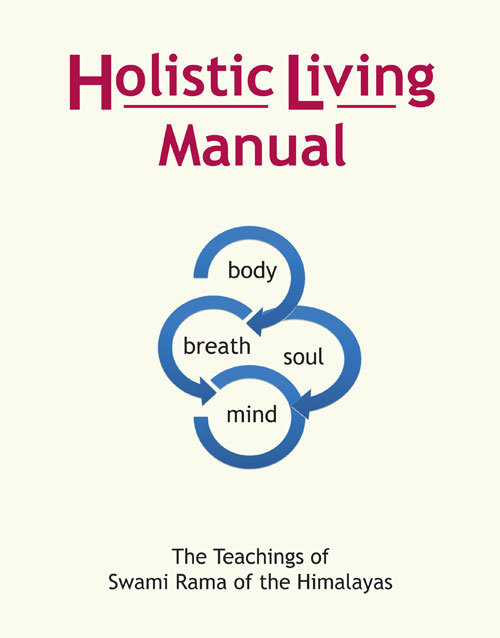Introduction
What is Holistic Living?
“I say, ye human beings, among all the species on the earth, you are the greatest. You are the greatest for you can change your destiny, you can build your destiny, you can enlighten yourself.” Swami Rama
We are very privileged to have been born as human beings. Human life is very precious. Human life is unlike the life of animals. Animal activities are completely controlled by nature through the guidance of instinct. But we human beings have the power of choice and we can change our destiny. We can utilize this brief span of human life to attain the purpose of life, which is to be contented and happy, free from all pains, anxieties, miseries and bondages.
The ancient sages of the Vedic period exhorted humanity with this stirring cry (Canto III, Kathopanishad):
Uttishtata: Arise, turn inwards to discover your true nature
Jagrata: Awake, put an end to the sleep of ignorance (of your true nature)
Prapya Varan Nibodhata: Attain knowledge by approaching the self-realized ones.
The knowledge they are referring to is knowledge of our own true nature. Our true nature is peace, happiness, and bliss. But we suffer because we do not know ourselves. The basis of holistic living lies in understanding the purpose of life and learning how to achieve that purpose. To achieve the purpose of life, we need adjustment—adjustment of the body, breath, emotions, mind and spirit.
We all seek happiness. Yet we suffer! This is because we seek happiness in worldly objects that have no power to satisfy us and free us from pain and ignorance. Our suffering is not caused by others but is caused by our own way of thinking and behaving. We have no understanding of our true nature. We have to learn to direct our energies inward. We have to learn to look within, find within and see within. The source of joy, peace and bliss dwells within us.
A short story will illustrate the trap we have fallen into:
A man is on his evening walk and a prized possession, his wristwatch, not being properly clasped on his wrist, falls off unnoticed as he walks. Later, realizing that his watch is missing, he starts scouring the sidewalk on his hands and knees, looking for the missing watch. A friend comes along and wonders what the man is doing at dusk on his hands and knees. When informed of the man’s plight, the friend enquires, “Where were you walking this evening?” The man points to the sidewalk on the other side of the street. Puzzled, the friend enquires, “Then why are you on your hands and knees on this side of the street?” The man replies, “Look it is dark over there, on that side of the street. Here, there is a street light and I can see things very clearly!”
We might be amused by the man’s response and wonder at his stupidity. However, we are all doing the same thing in our lives. We lost our peace of mind and happiness because we lost touch with our inner being, the source of peace and happiness. However, we keep looking for happiness in the outer world, on the other side of the street, where the glittering lights allow us to see worldly objects very clearly and seduce our senses. But this is not where we lost our peace of mind! We are seeking peace and happiness in all the wrong places, rather than going within to re-establish our connection with our true nature, the source of peace and happiness. Happiness is a state that is dependent on our inner world, not the possessions of the outer world. To be free from pain and misery, we have to realize our true nature, the source of joy, peace and bliss.
We create misery for ourselves because of our own way of thinking and living. We are living in an unnatural way. So, only we have the capacity to overcome this self-created misery. We have to resolve that we can transform ourselves, that we can change our destiny. For this we need firm determination, what is known as “sankalpa shakti” in Sanskrit. If I want to do something, I have to resolve, “I can do it, I will do it, and I have to do it, no matter what happens.” That is called willpower. If we want to do something, we should just do it. There is no use just thinking about it. We should just do it, no matter what happens, at all costs. That will create dynamic will and that dynamic will enable us to achieve great things in our life.
In modern societies, stress has become a daily experience. Stress results from doing something that we should not do, or being forced to do that which we are doing. Stress also results when we are unable to do what we really want to do, and that creates a conflict in our mind. Who gives us stress? What is the reason for stress? What is the cause of our suffering? We are creating stress for ourselves. We cannot live without doing our duties. The sages tell us, “Learn to love your duties, then your duties will not make you a slave. Grease your duty with love. Otherwise your duties will create bondage for you.” If we have understood this key, then we will try our best to perform our actions and learn the philosophy of nonattachment, which is called love. Love means nonattachment.
Every day, we should decide that no matter what happens, we will not let anything disturb us. We are all reactionaries. We do not have convictions. We may think about things, but we have not built an individual philosophy of life. The Buddha teaches us that we should face life’s pains as witnesses rather than as victims. Only then can we remain unperturbed and start enjoying what life has to offer us. We need to build our own philosophy of life that is simple and straightforward, independent of religion and culture. We should sincerely work to translate our philosophy of life into action. We need to realize our physical and mental capacity and should refrain from making rigid and unrealistic rules for ourselves. Nor should we have unrealistic expectations of others.
A human being is a citizen of two worlds, the world within and the world outside. The internal and external worlds must be brought into balance in order to fulfill the purpose of life. Man suffers because he has become an outsider. Those who are insiders, those who have learnt to go within, do not suffer on account of stress. The moment we become aware of ourselves, have true understanding of our nature, then we will begin to enjoy life. Then we will begin to realize that we are all interconnected, that we all belong to only one reality. If I am hurrying along a stony path and I stub my toes against a rock, my fingers reach out immediately to massage the toes in order to assuage the pain. This spontaneous act stems from the conviction that the fingers and toes are interconnected. They are part of one, single entity.
We should develop the conviction: “I will be conscious of the truth that the Lord of life is within me.” We should learn to go within, beyond body, breath, and mind, to enjoy that peace which is always within us. The experience of that inner peace will strengthen our conviction that we are all interconnected, that we are all one, that we belong to one universal entity. Then all fears, conflicts and selfishness will cease. Then we will be free.
All the things of the world, no doubt are meant for us. We can enjoy them. But are they ours? No. So we should not get attached to them. As St. Bernard has said, “All the things of the world are to be enjoyed, but God alone should be loved.” Attachment leads to misery and pain, nonattachment gives us freedom. Suffering will cease to exist in the world and the flower of humanity will bloom when we learn to skillfully, selflessly and lovingly manage our duties and relationships and start working for the good of each other.
For this, human efforts have to be made. When our efforts are sincere and complete and there is nothing more that we can do, then, if we cry for help, help will come from Providence. There is no limit to divine grace. But grace dawns only when we have worked sincerely to accomplish our mission in life, when we have made all possible efforts. This is the truth! We will then awaken the fires of light and love within us. This is what we have come to accomplish on this earth. This is holistic living!

